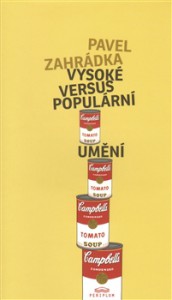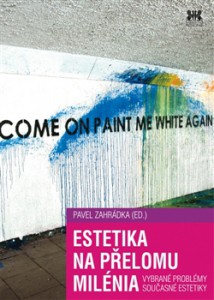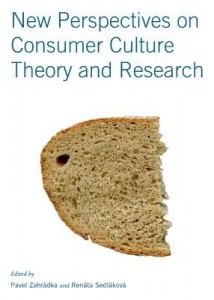Research Profile
 PAVEL ZAHRADKA is Assistant Professor of Sociology and Philosophy at Palacky University Olomouc, Czech Republic. In 2010 and 2011 he taught philosophy as a Visiting Professor at the University of Münster. His main areas of focus are theory of consumer culture and philosophy of art. In 2010-2013 his research project on sociological criticism of aesthetic autonomy was founded by the Grant Agency of the Czech Republic (GACR). Currently he is member of the Scientific Advisory Board of the research project PolitCIGs: Die Kulturen der Zigarette und die Kulturen des Politischen (2013-2016) at the Friedrich-Schiller-University of Jena and a member of the research team Re-presenting the Past: New Methods of History Interpretations in arts and the Media at the Palacky University Olomouc (European Social Fund, 2012-2015). He is also an external collaborator of the research project Geschichtsaneignungen in der Mediengesellschaft at the Otto von Guericke University Magdeburg.
PAVEL ZAHRADKA is Assistant Professor of Sociology and Philosophy at Palacky University Olomouc, Czech Republic. In 2010 and 2011 he taught philosophy as a Visiting Professor at the University of Münster. His main areas of focus are theory of consumer culture and philosophy of art. In 2010-2013 his research project on sociological criticism of aesthetic autonomy was founded by the Grant Agency of the Czech Republic (GACR). Currently he is member of the Scientific Advisory Board of the research project PolitCIGs: Die Kulturen der Zigarette und die Kulturen des Politischen (2013-2016) at the Friedrich-Schiller-University of Jena and a member of the research team Re-presenting the Past: New Methods of History Interpretations in arts and the Media at the Palacky University Olomouc (European Social Fund, 2012-2015). He is also an external collaborator of the research project Geschichtsaneignungen in der Mediengesellschaft at the Otto von Guericke University Magdeburg.
Books
The book Aesthetics at the Turn of the Millennium presents nine selected topics of contemporary aesthetics. They are the definition of art, ontology of art, the value of art, art and forgery, high versus popular art, art and ideology, art and copyright law, environmental aesthetics, and feminist aesthetics. Its goal is to introduce readers to these problem areas of philosophical aesthetics and acquaint them with the solutions offered by these as well as their respective approaches and appropriate terminology. This goal is achieved primarily through original survey texts included as an introduction to each of the nine chapters. Each of these are followed by two carefully selected studies, the authors of which – representing both the Anglo-American analytical and continental philosophical traditions – often take on the polemical problems from diverging positions. The studies included should thereby provide readers not only with an immediate overview of the current discussions, but also lead them to critical reflection on the problem and to develop their own positions.
Publication New Perspectives on Consumer Culture and Research is dedicated to the exploration of three areas of consumer culture: research on consumer culture and consumer behaviour in post-socialist countries, new developments in the theory of consumer culture and innovative methodological approaches to its research and, finally, to recent criticism of consumer culture and consumerism. It emerged from the collaboration of a team of authors made up of leading European researchers in the field of consumer culture, such as Kate Soper (London Metropolitan University), Franz Liebl (Berlin University of the Arts) and Rainer Gries (University of Vienna), as well as promising young scholars from the Czech Republic, Great Britain, Sweden, Serbia, Poland and Portugal. This book will be of great interest to students and scholars of sociology, cultural studies, marketing and market research.¨
-
The goal of the book High versus Low Art is a systematical inquiry about the conceptual difference between high and popular art, which is directed to the question,  on which grounds does this difference operate. There are in principle two different theoretical approaches to the problem in question, which bring two different solutions: the aesthetical one or the sociological one. While some aestheticians (Theodor Adorno, Max Horkheimer, Abraham Kaplan, Clement Greenberg, Dwight Macdonald) believe, that the difference between high and popular art consists in different aesthetical qualities of both types of artworks, sociological oriented authors (Pierre Bourdieu, Lawrence Levine, David Novitz) assume, that the distinction is a man-made social construction, which does not reflect any differences in aesthetical qualities of artworks, but serves to reproduction and legitimization of the social inequalities. The goal of the work is an explanation and critical evaluation of both aesthetical and sociological solutions of the problem.
on which grounds does this difference operate. There are in principle two different theoretical approaches to the problem in question, which bring two different solutions: the aesthetical one or the sociological one. While some aestheticians (Theodor Adorno, Max Horkheimer, Abraham Kaplan, Clement Greenberg, Dwight Macdonald) believe, that the difference between high and popular art consists in different aesthetical qualities of both types of artworks, sociological oriented authors (Pierre Bourdieu, Lawrence Levine, David Novitz) assume, that the distinction is a man-made social construction, which does not reflect any differences in aesthetical qualities of artworks, but serves to reproduction and legitimization of the social inequalities. The goal of the work is an explanation and critical evaluation of both aesthetical and sociological solutions of the problem.
Academic Papers
„Pojem umění v analytické estetice“ in: Aluze 2-3 (2004), 155–174.
„Copyright & Art. Aesthetical, Legal, Ontological, and Political Issues“ in: Aluze 2 (2005), 185–188.
„David Novitz, filozofie umění a hry na hrdiny“ in: Aluze 1 (2006), 132–133.
„Muss man in der Ästhetik Anarchist sein? Karlheinz Lüdeking im Gespräch mit Pavel Zahrádka“ in: Zeitschrift für Ästhetik und Allgemeine Kunstwissenschaft, 52/2 (2007), 245–259.
„Je třeba být v estetice anarchistou?“ in: Aluze 1 (2007), 14–23.
„Mýtus o mýtu krásy“ in: Aluze 2 (2008), 117–126.
„Já a David Bowie“ in: Aluze 1 (2009), 101–105.
„Může spotřební kultura nahradit vysokou kulturu?“ in: Aluze 2 (2009), 26–34.
„Wolfgang Ullrich im Gespräch mit Pavel Zahrádka: Kann die Hochkultur durch die Konsumkultur ersetzt werden?“ in: Zeitschrift für Ästhetik und allgemeine Kunstwissenschaft 1 (2010), 140–155.
„Současná problematika vysokého a masového umění“ in: Jiří Šubrt (ed.): Soudobá sociologie IV. Praha: Karolinum, 2010, 207–232.
„Definice umění“ in: Pavel Zahrádka (ed.): Estetika na přelomu milénia: vybrané problémy současné estetiky. Brno: Barrister & Principal, 2011, 15–38.
„Theory and Research on Consumer Culture in the Czech Republic before and after 1989“ in: P. Zahrádka – R. Sedláková (eds): New Perspectives on Consumer Culture Theory and Research. New Castle: Cambridge Scholars Publishing, 2012, 12–38.
„Sociologická kritika filozofické estetiky“ in: Filosofický časopis 3 (2013), 349-370.
„Kritika estetického hierarchismu a její důsledky pro teorii umění, uměleckou kritiku a estetickou axiologii“ In: Slovo a smysl 20 (2013), 15–28.
Interviews
„Jsem skeptický vůči ohlašování krize či konce umění“ in: Deník Referendum (23/10/2010).


Comments are closed, but trackbacks and pingbacks are open.